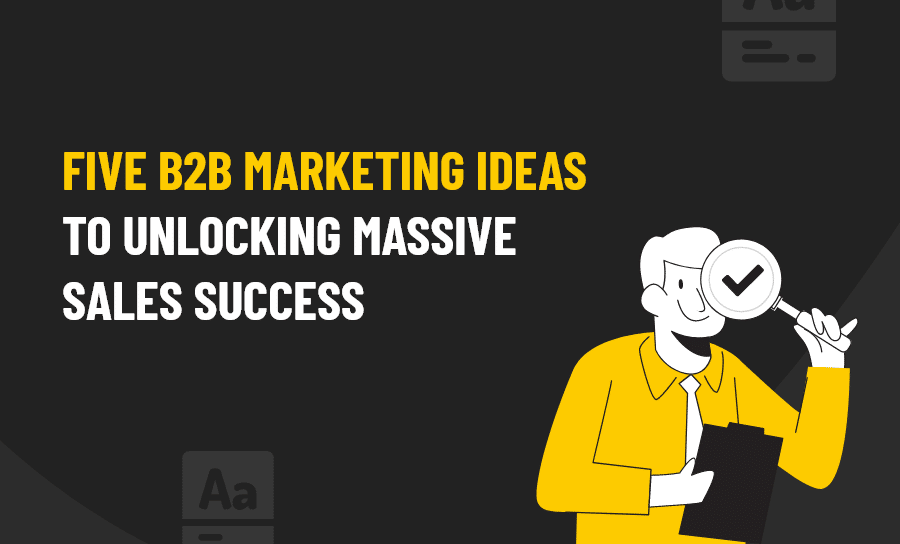FIVE BEST B2B MARKETING IDEAS
Ah, digital marketing…the finesse of ensuring that your campaign is set…especially in the B2B market can be full of dizzying twists and turns.
This quick guide will give you some top B2B marketing tips and ideas to help you on your path. From what B2B marketing is, why you need it, and the tips and tricks themselves.
WHAT IS B2B MARKETING?
B2B marketing is business-to-business marketing. This means that one business is buying a product or services directly from another business.
B2B marketing tends to be more straightforward with fewer steps than B2C and also more informational due to the nature of the buyers and products involved. These products can include technology, security, office supplies, SaaS, and much more.
WHY YOU NEED B2B MARKETING?
B2B marketing is a must. Bringing in leads keeps the business afloat. Having a well-built marketing plan for your B2B business ties this all together.
As a B2B marketer, you should know that your marketing plan should be able to communicate to your prospects why they need you and why you are the best. Without this…you are simply waiting to go under while someone more effective will come in and swoop up your customers.
FIVE B2B MARKETING IDEAS TO HELP BOOST SALES
1. Reduce the flow of excessive information
In modern society, both online and offline, there is a constant flow of information that can then turn into information overload. With how a B2B marketing campaign operates, there tends to be a higher level of decision-making occurring. With this, it means only to give the most pertinent information and features when making a sale.
Having all features is great when giving a comparative, but with initial proposals and presentations, it works better to highlight your best features and most unique advantage versus a competitor. Including too much information about your product in the B2B, market adds to the information overload and can be more of a repellant rather than a favorable point.
2. Make a great first impression
I can guarantee, before a potential customer agrees to a sales call or replies to an email they will do a sweep of your brand through a Google search.
We, as consumers, attach online presence with a certain level of reliability and authenticity. This means positioning yourself across platforms with a FULLY OPTIMISED social media profile is critical. This means having contact information, photos, cover photos, a finished about/bio, and engagement is key. Social media marketing is a thing – not just for content marketing, but for your own business and improvement of your sales strategy.
Platforms commonly checked may include…but are not limited to are:
- Google My Business
- Clutch
- Trust Pilot
- Glass Door
For each niche, there may also be specialty niches to list on as well.
I.e. SaaS tools may also list on G2, Capterra, and Product Hunt.
Finding your full scope of available profiles and directories…again…allows for the most visibility as possible. This visibility allows you to pop up in more relevant keyword searches and helps establish niche dominance. These platforms also allow and should encourage you to garner reviews for your company, products, and services. Your target audience always does research before committing to something, so make sure you’re putting your best self out there if you want your b2b company to succeed.
These reviews also add to the expertise you can hold in your niche and support your knowledge and reliability as a business choice. A prospect will likely search you and search for reviews…both positive and negative…so being able to showcase what you do well and not well can give an expectation to services and quality.
*bonus note* Don’t try to bribe or buy positive reviews…or reviews in general. Urging clients to write their own truthful reviews is by far better…having all 5-star reviews that don’t look authentic can come across as fishy and untrustworthy. Having a few negative reviews shows you aren’t perfect and gives a spot in being able to grow and improve your business. Engage with all reviews and use them for learning points.
3. Fine-tune your approach
Although third on the list, ensuring you have a stellar message copy to send out can be one of the biggest B2B marketing tips on this list. It does not matter how great your product or service is if the way you approach selling it is absolute rubbish – marketing efforts pay off.
If you are doing outreach via direct messages on social platforms, be sure to type it in a way that is easy to read on mobile and comes across as friendly rather than aggressive…. sprinkle in emojis and personalisation (use their name and company name, maybe insert a reference blog post).
For emails, follow a similar template. Personalise it to your client and make them feel important to you and your own company. B2B marketing has a certain level of relationship-building attached to it to maintain to create lifetime clients.
If you sell office supplies…you want to connect with companies that will keep you on contract as their go-to, first choice supplier.
Understand that your first go may not be the right one, so be prepared with back-up plans and back-up scripts and copy for communication. B2B and B2C sales don’t have to be difficult if you consider all possibilities.
4. Target the correct prospects
Hand in hand with having a great message sequence to nurture your leads…is being sure you are messaging the correct people. If you sell garden supplies wholesale you probably aren’t securing a deal with a dental clinic. Understanding your buyer persona is key!
As a b2b salesperson, you MUST know who is going to be best suited for your product. In B2B marketing, this means building up a couple of user personas. This can help target industries, the position of the individual, personality traits, and other factors to build a template out in who to best target. Knowing different types of prospects also means knowing how to adjust your messages and how you approach them to give the best push through your sales funnel.
I.e. If you sell printer and office supplies, you will want to target an individual that does inventory management or is listed as a buyer for the company. Targeting someone that isn’t a merchandiser of some sort and aiming at someone too low on the ladder or a CEO that does not have a hand in supplies may lead to a potential loss of sales.
B2B sales should be worked on with a 1-on-1 approach…or mindset at least. Creating those everlasting contracts is critical to manufacturers’ or wholesalers’ success. Make your messaging and outreach reflect the personalisation that is thought of with 1-on-1 relationships.
5. Make sure you have an actual marketing plan
Late night drinks and friend gatherings around a patio table can often result in some strange ideas….especially off-the-wall business ideas. An idea does not hold much value though if there is not a plan in place.
Marketing is no different.
When approaching B2B marketing, ensuring you have a plan in place is a must for having a successful campaign.
Ask yourself the following:
- Who needs my product?
- What type of person will make the end decision?
- How should I write my copy to approach them?
- How many sales do I need to break even?
- How many messages a day do I need to send?
- Why are we the best?
These are just the tips to the iceberg though. You need to be sure that you have a timeline for events to follow and an ability to track this and be able to improve when needed. Regularly review your strategies and focus on specifics. Maybe you need improvements on only a part of your whole strategy. You can review the following:
SOME FINAL NOTES TO B2B MARKETING SUCCESS
B2B sales take skill…trying to go in without a plan will not get you far in terms of profit. B2B marketplaces are high stakes with heavy competition….getting your marketing and sales process right the first time is a necessity.
A/B testing helps, but having a tried and true process with backup plans ensures that you can make sales.
BONUS POINTS
Focus on different aspects of B2B marketing from a digital point of view. There is more out there to gain a higher ground than just your outreach.
Blogs allow for continual content to hit top searched keywords and to show updates to the search engines…blogs also can serve as bonus materials for potential clients in giving them more information beyond services bought.
SEO is a must for all businesses, but having a fine-tuned website allows for search engines and users to best find you. Keeping up with updates and best practices can help hold and improve your ranking.
Social media is another requirement to be found…keep all your socials active and fully optimised. This adds authority to your brand name and allows for more resources to pop up in Google queries. This also adds a potential find if your prospect starts a search on a platform rather than a search engine.
eBooks can be a way to boost major authority and reputation for a company. Having a resource available for purchase on a well-known selling/buying platform (like Amazon) can give a push to authenticity and help guide a business owner to your products or services once reading.
Youtube can be separated from other social media profiles in the way it appeals to users. Having videos explaining and educating within your niche can provide a space for content that can include your site links and can be used on your site itself…again being able to showcase expertise and case studies.
Email marketing can be lumped into an overall marketing approach in the B2B field. Email outreach can be a powerful tool when used correctly. Having a well-thought piece that offers personalisation lets you jump into cold approaches for your marketing.
faqs
B2B marketing stands for “business to business marketing,” as opposed to B2C marketing or “business to consumer marketing.” While B2C marketing targets everyday consumers in its advertising, promotions, and general marketing, B2B marketing targets other businesses or companies. You’re probably very familiar with B2C advertising as it’s the key marketing strategy for most businesses and brands that you’ll come into contact with as a consumer. Every time you see an advertisement on the telly, you’re witnessing B2C marketing in action.
You can find a great example of B2B marketing on the Pearl Lemon Leads homepage. All of Pearl Lemon Leads’s promises and advertisements are identifying a pain point in other companies (failure to generate high-quality leads) and seeking to alleviate that through our business offering (an experienced lead-generation team). When a business is utilising a B2B marketing strategy, they’re doing something very similar by identifying a company’s pain point and offering a service that will aid them.
Here’s an easy step-by-step process to create a winning B2B marketing strategy for your business:
- Identify a problem that many companies face that your business can fix. This may seem like an easy one to remember, but companies often lose sight of the problem they’re facing, especially when their product or service can solve more than one problem. For example, if you’re running a company that generates leads for your clients (very original, we know 😉), then you want to make sure that every one of your services (e.g. cold calling, copywriting, contact list generation) ties back into your fundamental mission of lead-generation because it’s an everyday struggle that businesses both old and young face.
- Figure out what differentiates your company from your competitors. Decision-leaders will get thousands of emails flooding their inbox every day about how their competitors can improve their lead generation, IT services, and product delivery. That’s why you must understand the differentiating factor in your business. You’ll stand apart from your competitors and show decision-leaders in the industry that you’re no ordinary partner.
- Utilise cold messaging, both traditional and digital. At Pearl Lemon Leads, we’ve had great success using traditional mediums like calls and emails and digital mediums like social media and SEO to generate leads for our clients. Any good B2B marketing strategy will use all the communication avenues they have at its disposal to craft a marketing campaign that targets the right businesses, gets its message across, and win leads.
The four types of B2B markets are:
- Producers – These companies buy products or services to aid in the creation of their products and services. An example of a producer market would be when McDonald’s buys their hamburger meat and produce from national farms and food producers. That meat and produce get transformed into the burgers that Mcdonald’s sells to their customers.
- Resellers – These companies purchase products so they can resell them to consumers in their stores without changing the product. When Walmart buys your favourite toys from Lego or Hasbro, they’re operating within a reseller market.
- Government – The government can’t produce everything on their own. Often, when they need tasks are done or access to a product, they’ll contract with private companies to help them build roads, collect garbage, manufacture weapons, and more. In fact, Her Majesty’s Government spends £284 billion a year on buying goods and services from external suppliers.
Institutions – This type of market is very similar to how the government B2B market operates, except those private institutions like churches, hospitals, charities, and private universities get involved. A great example of this is when hospitals buy their medical equipment from medical device suppliers.
Ultimately, B2B marketers want to make their company’s brand name recognisable to other companies and businesses. A lot of the time, businesses won’t be interested in the product right away or might ignore the company’s marketing messages. As long as that trend doesn’t continue, it’s okay for the time being. That’s because B2B marketers want their company to be on the “shortlist” of candidates for decision-makers and business leaders. The company may not need their service right now, but if they produce a memorable campaign and demonstrate their worth, then their leads will return to them when it’s time to make a decision.
Two significant parts of online B2B marketing are SEO and social media campaigns. Put yourself in the shoes of a business leader in charge of an engineering company. You’ve fallen behind on your projects, and you’re looking for a partnership with an outsourcing company that’ll help you with your work. What’s the first thing you’re going to do? You’re going to go to Google and search for “engineering outsourcing companies” or something similar.
If your company website isn’t within those first couple of candidates, then loads of businesses looking for your service aren’t going to find you and see what you have to offer. That’s why SEO is so crucial for your site. It makes sure that you’re always one of the first companies considered by business leaders and that you’re not being ignored.
Social media also is a big part of online B2B marketing. If that same engineering company leader can’t find a company that works for them, they’ll probably go on their LinkedIn and see what connections they have. And then boom! There you are, right in their inbox. The bottom line is that any online B2B marketing strategy needs to make sure that your company is gaining a digital presence on multiple channels.






